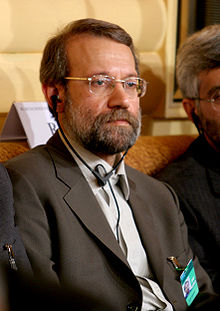Ali Larijani

Ali Ardeschir Laridschani (also Ali Laridjani or Larijani ; Persian على اردشیر لاریجانی[ æˈliː lɔːriːʤɔːˈniː ]; Born June 3, 1958 in Najaf , Kingdom of Iraq ) is an Iranian politician . Larijani is considered henchman Ali Khamenei , is the secretary of the responsible for nuclear issues National Security Council and, since May 26, 2008, by the power shift in the Iranian parliamentary elections in 2008 , Speaker of the Parliament and parliamentary speaker and was considered a potential candidate for the presidency of Iran.
Life
Larijani, son of Ayatollah Hashem-Amoli , comes from a politically influential family. His brother Sadegh Larijani has been chairman of the Iranian judiciary since 2009, Mohammad-Javad is director of the Institute for Theoretical Physics and Mathematics in Tehran, Bagher Larijani is director of the Tehran University of Medical Sciences , and Fazel Larijani is an Iranian cultural attaché in Ottawa . Ali Larijani is married to Farideh, the daughter of Ayatollah Morteza Motahhari , and a cousin of former presidential candidate Ahmad Tavakkoli .
Larijani studied mathematics , is a computer scientist and philosopher and served as minister of culture under the presidency of Ali Akbar Hāschemi Rafsanjāni . From 1994 to 2004 he headed the state broadcaster IRIB and was also a member of the Iranian Revolutionary Guard . Larijani was seen as an opponent of the "reform policy" of former President Mohammad Chātami . During his time as head of television, he only allowed conservative voices to speak, criticized Iranian reform politicians. In the presidential election in June 2005 , as a conservative candidate, he received almost six percent of the vote.
Larijani was appointed chief negotiator in the nuclear negotiations with the EU under the Mahmoud Ahmadineschād government. On August 18, 2005, he replaced Hassan Rouhani, who was considered to be moderate . No breakthrough in the dispute over the Iranian nuclear program could be achieved under his leadership of the negotiations , as his choice of words did not differ in substance from the line of the president. On October 20, 2007, his allegedly long-planned resignation as chief negotiator in the nuclear talks with the EU-3 was announced by government spokesman Gholam-Hossein Elham , and his successor was Said Jalili . Diplomats interpret this as a victory for the hardliners around President Ahmadinejad.
According to its information on December 7, 2007, on the occasion of the publication of the US government's intelligence report, Iran “never” sought to acquire nuclear weapons. "The wording in the recently published US intelligence report that Tehran stopped its nuclear weapons program in 2003 is simply a 'lie'."
Larijani was seen as a new strong man in Tehran when he was elected President of Parliament in May 2008. As a proven opponent, Mahmoud Ahmadineschād was given a chance in the next presidential election.
On February 6, 2009, he caused irritation at the Munich Security Conference . On the question of the Holocaust , he said: He was "a bit surprised at how sensitively you react." In Western countries, Mohammed can be insulted with impunity, and statements about the Holocaust are not punishable in Iran. There are “different points of view”. He is not a historian: “I'm a politician, I don't want to talk about the subject now.” In an interview given to Spiegel Online , Larijani described the Holocaust as a “ historic event ” that was not Iran's problem. In an interview with Euronews , Larijani compared Iranian nuclear activities with the Japanese and insisted that Iran should use nuclear energy peacefully.
At the end of May 2012, Larijani was elected President of Parliament for the second time. He won the election with 173 of 275 votes against Gholam Ali Haddad-Adel , who was also critical of Ahmadineschād and received 100 votes.
Web links
- Ali Larijani website (Persian)
- Portrait of Ahmad Taheri, FAZ from June 7, 2005
- Ahmadinejad's Pyrrhic Victory, FAZ from October 26, 2007
Individual evidence
- ↑ Ali Larijani ( Memento of 23 February 2014 Internet Archive )
- ^ A b Spiegel Online , Hasnain Kazim, June 17, 2009: Ayatollahs, philosophers and a billionaire. Part 5: Conservative with a future - Ali Larijani
- ↑ Iran declaration by the Federal Foreign Office of September 28, 2007
- ↑ Spiegel online from October 20, 2007
- ↑ Diplomatically assigned , Tagesspiegel of October 21, 2007
- ↑ Larijani: Iran never wanted to manufacture nuclear weapons. In: derStandard.at. December 15, 2007, accessed December 6, 2017 .
- ↑ dw-world of May 27, 2008
- ↑ Sebastian Fischer: Iran brusquely rejects the offer of dialogue. In: Spiegel Online , February 6, 2009.
- ↑ Georg Mascolo , Gerhard Spörl , Sebastian Fischer: "The great powers have to accept - there is reason on our side too" In: Spiegel Online , February 8, 2009 (interview).
- ↑ Euronews, July 23, 2010: Interview with Ali Larijani: Nobody can be convicted until he has done something
- ↑ Ahmadinejad critic is the new President of Parliament ( Memento from May 30, 2012 in the Internet Archive ) at tagesschau.de, May 28, 2012 (accessed on May 28, 2012).
| personal data | |
|---|---|
| SURNAME | Larijani, Ali |
| ALTERNATIVE NAMES | Larijani, Ali Ardeschir (full name); Laridjani, Ali; Larijani, Ali; على اردشیر لاریجانی (Persian) |
| BRIEF DESCRIPTION | Iranian politician |
| DATE OF BIRTH | June 3, 1958 |
| PLACE OF BIRTH | Najaf , Kingdom of Iraq |

